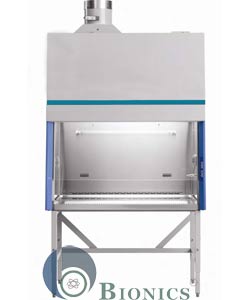microbiological safety cabinet - Knowing The Best For You
microbiological safety cabinet - Knowing The Best For You
Blog Article
Class 2 Biosafety Cabinets: Essential Equipment for Laboratory Safety and Microbiological Containment

Maintaining a safe lab environment is crucial in today’s advanced research and clinical setups. Whether it's handling live pathogens or sensitive diagnostics, biosafety cabinets play an integral role in contamination prevention and sample integrity.
Class 2 Biosafety Cabinets are widely adopted for offering three-way protection. These units are essential for labs working with infectious materials or clinical diagnostics.
Biosafety Cabinets – How They Work and Why They Matter
Biosafety cabinets are ventilated enclosures built to protect both users and biological materials. They use HEPA filtration to remove contaminants from incoming and outgoing air.
These units are generally classified into Classes I, II, and III depending on airflow and application needs. Among these, Class 2 biosafety cabinets are the standard choice for most applications.
Defining Class 2 Biosafety Cabinets and Their Role
Class 2 Biosafety Cabinets are designed to safeguard three aspects: the operator, the sample, and the environment. They generate a vertical airflow that reduces turbulence and contamination.
Contaminated air is drawn into the cabinet and filtered through HEPA systems before recirculation or exhaust. These cabinets are frequently used in labs handling infectious agents or clinical samples.
Key Features of Microbiological Safety Cabinets
A Class 2 microbiological safety cabinet includes several critical technologies such as:
• Medical-grade filters for capturing contaminants
• Laminar airflow that minimises disruption and contamination
• Negative pressure barriers to prevent leakage
• Germicidal UV lamps to disinfect the work area
• Noise-reducing construction for better working conditions
• Clear front panel for visibility and safety
These elements support lab workers in maintaining sterile working environments.
Industries and Labs That Rely on Microbiological Safety Cabinets
Class 2 Biosafety Cabinets are key equipment in healthcare, molecular biology, and quality control. They are ideal for safe handling of samples during testing and experimentation.
From universities to private pathology labs, Class 2 cabinets ensure lab hygiene and sample integrity.
Why Laboratories Prefer Class II Safety Cabinets
Using Class 2 cabinets offers multiple advantages including operator protection and experimental reliability:
• Reduces the risk of sample cross-contamination and error
• Acts as a barrier between user Class 2 Biosafety Cabinets and biohazard
• Minimises lab contamination and pollution risks
These cabinets support biosafety goals while improving lab productivity.
Cabinet Types and Global Compliance
Top manufacturers ensure their cabinets meet certifications like NSF 49, EN 12469, and WHO recommendations. Class 2 units are sub-classified as A1, A2, B1, and B2—each with distinct airflow and exhaust features.
• Type A2: Ideal for general-purpose labs
• Type B2: Exhausts 100% of air via ducting; no recirculation
Selecting the right configuration ensures compliance and safety.
Choosing the Right Biosafety Cabinet
Before purchasing, consider:
• The biosafety level required (BSL-1, BSL-2, or BSL-3)
• Ventilation compatibility and placement
• Energy consumption and maintenance frequency
• Warranty, training, and certification services
Working with reliable manufacturers provides peace of mind and technical guidance.
Installation and Safety Guidelines
For optimal results:
• Install the cabinet in a draft-free, low-traffic zone
• Get periodic validation from certified technicians
• Educate staff on cabinet operations and safety
Operational best practices include:
• Use gloves, gowns, and face shields while operating
• Minimise hand movements inside the cabinet
• Clean all contact points post-operation
• Treat UV usage as an overnight sterilisation method
Final Thoughts on Class 2 Biosafety Cabinets
Class 2 biosafety cabinets are vital equipment in laboratories dealing with biohazards. They ensure contamination-free experiments and personnel safety.
From clinical research to vaccine development, Class II cabinets maintain sterility in sensitive procedures. When investing in a biosafety cabinet, choose performance and reliability over cost-cutting—because lab safety is non-negotiable. Report this page